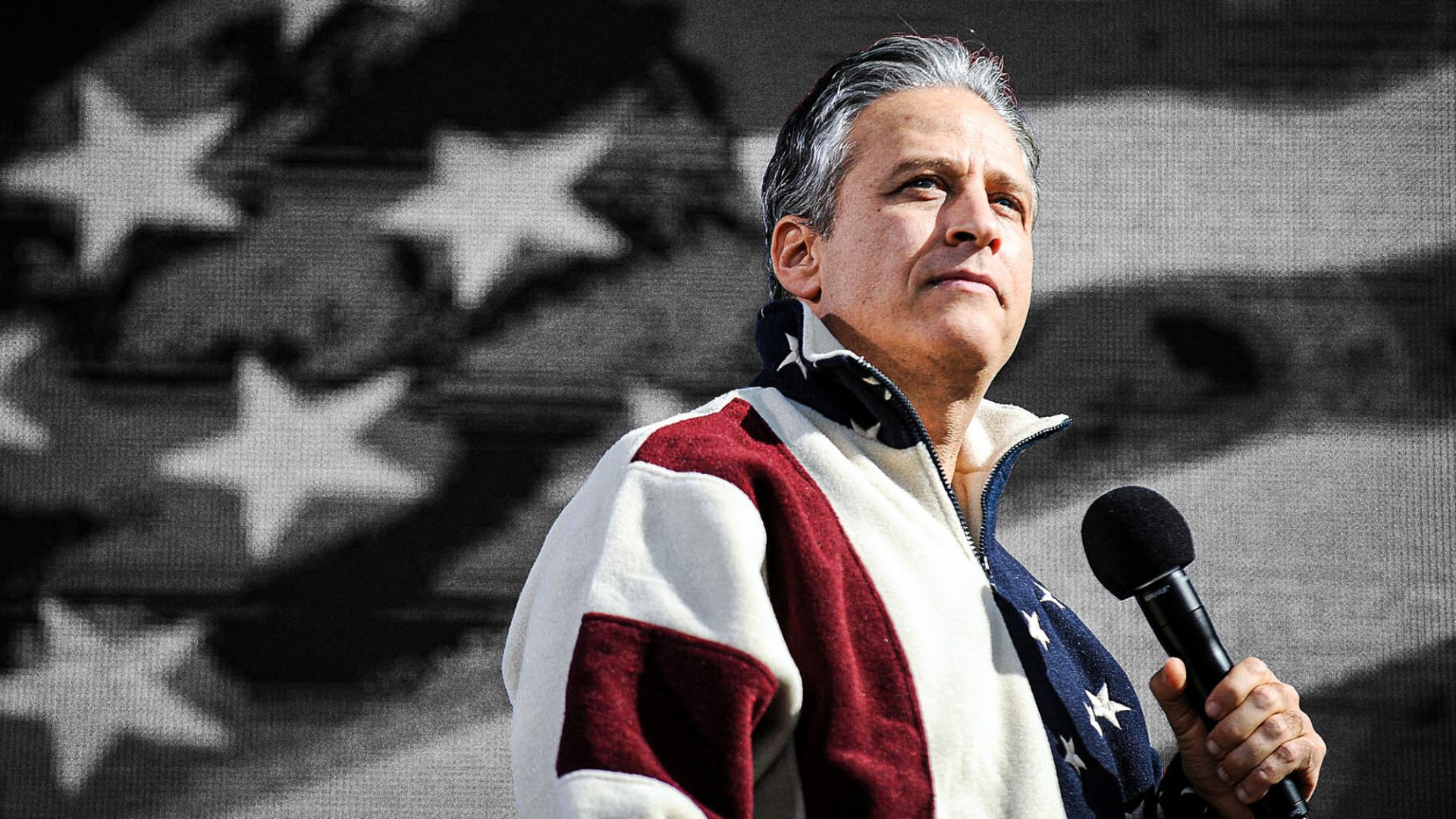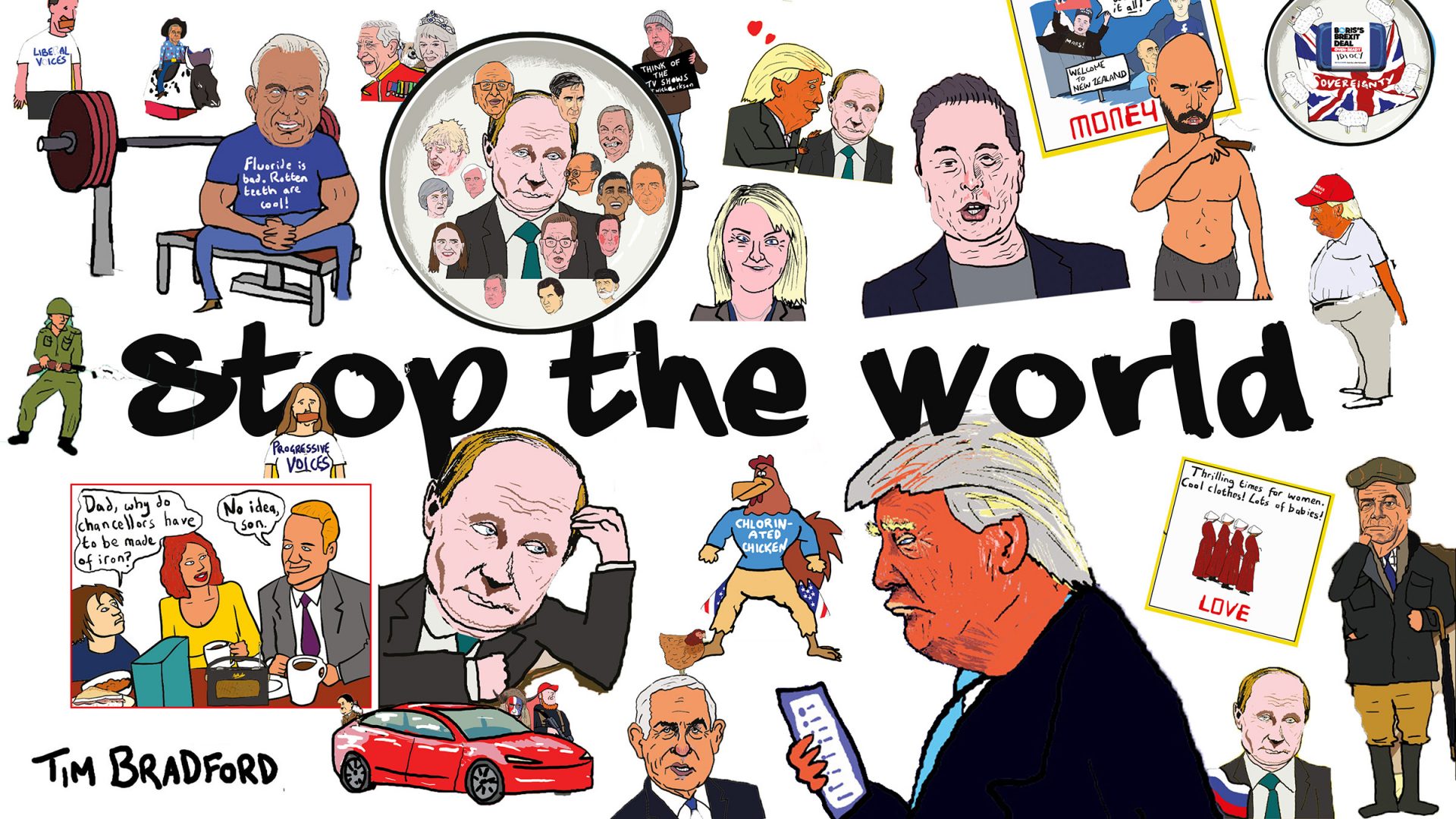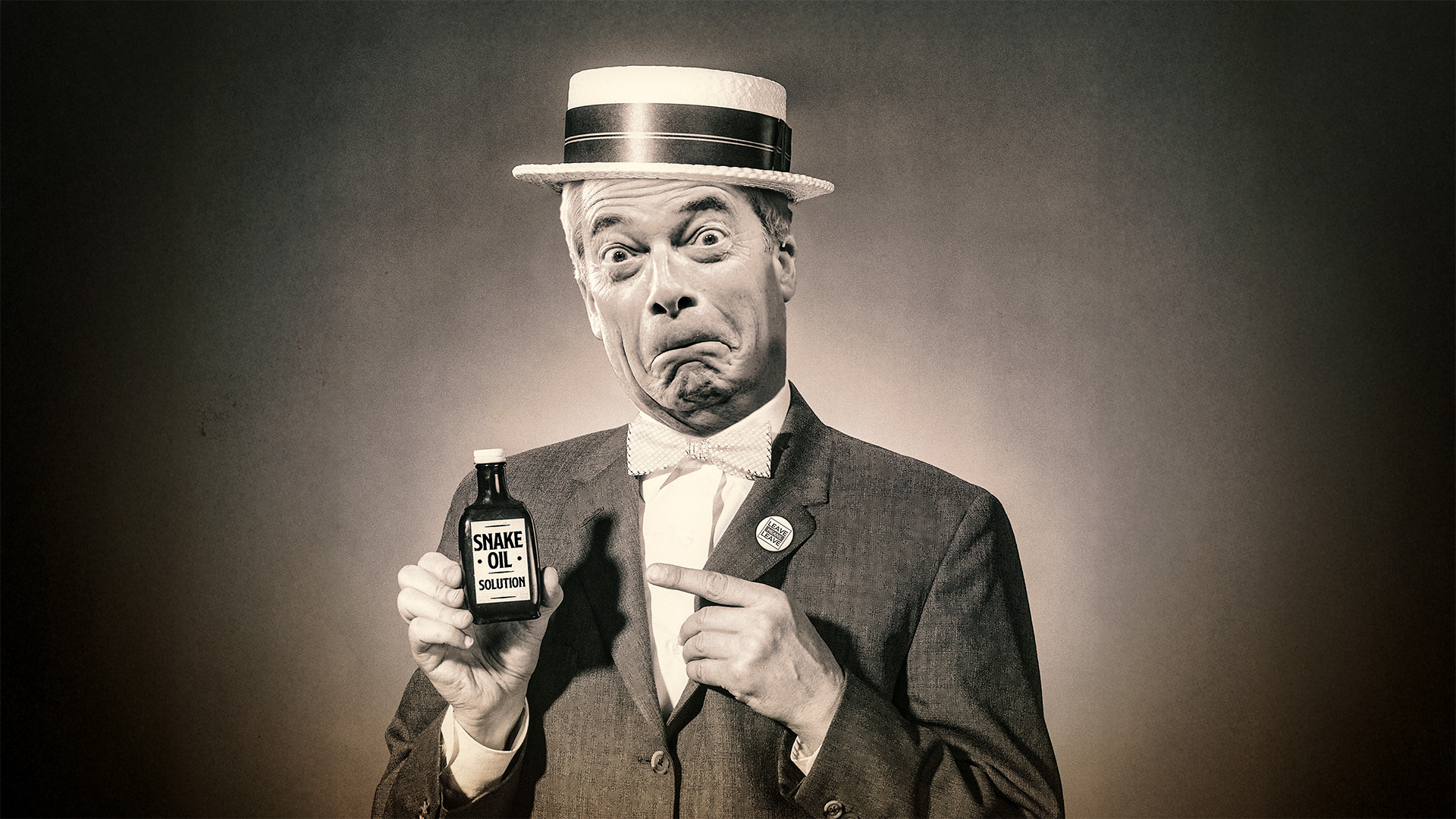In 2010, when the right wing TV personality Glenn Beck hosted a “Restoring Honor” rally in Washington, the comedian Jon Stewart – then in his 11th year as host of The Daily Show on Comedy Central – announced a competing march, called the “Rally to Restore Sanity”.
Stewart co-hosted the rally with Stephen Colbert, whose recurring segment on Stewart’s Daily Show had spun off into its own separate show called The Colbert Report, an explicit parody of far right “news” hosts like Bill O’Reilly. As the O’Reilly style had spread and grown in power and influence on the right, Colbert and Stewart had become by far the best guides to understanding it; far better than traditional news outlets.
Even 15 years ago, their influence was palpable. More than 200,000 people attended the rally on the National Mall, almost three times as many as had attended the Beck event it was parodying.
Read today, Stewart’s closing address to the crowd is strikingly prescient about the direction of the American media ecosystem. “The country’s 24-hour political pundit perpetual panic conflictinator did not cause our problems,” he told the crowd. “But its existence makes solving them that much harder.
“The press can hold its magnifying glass up to our problems, bringing them into focus, illuminating issues heretofore unseen, or they can use that magnifying glass to light ants on fire and then perhaps host a week of shows on the sudden, unexpected dangerous flaming ant epidemic. If we amplify everything we hear nothing.”
The line between satire and reality in America has only become more blurred since then with the dawning of the Trump age. It has been widely speculated that being mocked by Barack Obama in a speech at the traditionally jokey White House correspondents’ dinner in 2011 was the moment Donald Trump decided to run – a theory that sums up the merry-go-round of comedy, spite, and power that defines this era.
Trump spends a lot of his energy obsessing about comedians who mock him. In May, CBS cancelled The Late Show with Stephen Colbert, a move executives described as “purely a financial decision” – stretching plausibility, given that the show commanded the largest audience in late-night television. Colbert was a frequent target of Trump’s Truth Social rants. Three days before he was fired, Colbert had criticised parent company Paramount’s $16m settlement with Trump in a lawsuit its lawyers had previously described as meritless and a “big fat bribe”.
In September, ABC announced that it was taking the late-night show Jimmy Kimmel Live off air after the comedian talked about the assassination of Charlie Kirk in his monologue. A concerted campaign had followed, including threats by Trump’s Federal Communications Commission chairmen to impose sanctions on ABC and its parent company, Disney – which led to the show’s cancellation. But this time, it turned into something of a tipping-point; a line in the sand was drawn. There was a widespread backlash, including protests and a boycott of Disney’s streaming platform and its theme parks, and Kimmel was reinstated a week later.
“ In the day after Kimmel got fired, there was this moment where I think we all understood that we needed to stand up for one of our own,” said Ben Collins, CEO of satirical newspaper The Onion. “ I don’t care what you think about Jimmy Kimmel or his jokes or whatever. The fundamental premise of both comedy and American life were under attack.”
There has long been a feeling that, given this blurring of the lines between satire and politics, Jon Stewart might be uniquely positioned to step from one to the other.
“You are a cure to what ails our culture. You’re a voice that people consistently trust,” the comedian Dave Chapelle told him at a ceremony honouring the Daily Show host with the Mark Twain prize for humour in 2022. “I wish that you’d run for president.”
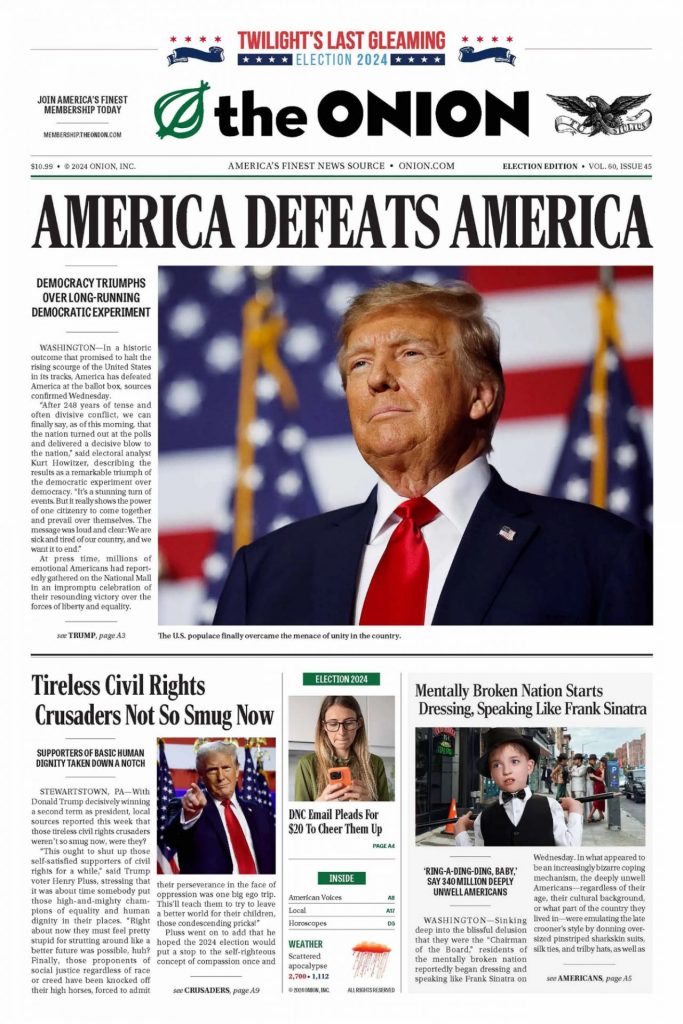
Increasingly, as America barrelled into the second Trump era, momentum started to build behind the idea. Political commentator and CNN analyst Chris Cillizza asked on a YouTube livestream in January, “Is Jon Stewart going to run for president?” adding that it was “a question I get five times a week”.
In April, Owen Baxter, a 20-year-old student at the University of North Carolina, Chapel Hill, wrote an op-ed for his student paper, the Daily Tar Heel, imploring Stewart to run for president. “ Stewart is the one, if you pick all the Venn diagrams of like all the issues… the one person who checks all the boxes,” he tells me. An outsider, but with decades of political experience; a celebrity who isn’t beholden to the Democratic Party machine.
“I would love to see Jon Stewart run,” rapper Charlamagne tha God said on Fox News in August. “If we’re talking about a change agent, coming from the outside, that’s really going to change things up – someone who can speak to all people.”
Already, among potential 2028 candidates, Stewart polls level with serious, established politicians like Michigan governor Gretchen Whitmer and Illinois governor JB Pritzker. There are already several campaigns to draft him into the race.
“What do we have to do to get him to run,” Kyle Kulinski, presenter of Secular Talk, asked on his show in September. “Jon, I’m appealing directly to you… bottom line, you probably don’t want this, but your country needs this.”
Baxter adds: “Liberals like him, leftists like him, independents like him – and conservatives don’t all hate him. That’s the prime candidate you want.”
A satirist feels right for our times. A section of the user-generated website Reddit, the r/NotTheOnion subreddit, shares real news headlines that all read like the silliest, most bitter black humour. “Florida Deploys Police To Stare At Crosswalks, Stop Them From Being Painted Rainbow Colors”; “Gavin Newsom’s team unveils new nickname for Kristi Noem”; and “RFK Jr. slams windmills for killing whales despite being accused of chopping one’s head off” are just a few from the last week.
The group, which has 26 million members, begs the question: how do you satirise current affairs when things are so utterly ridiculous? When everything now reads like an Onion headline?
Founded by students in Madison, Wisconsin, in 1988, The Onion grew into a cultural touchstone. In 2016, Univision purchased a 40% stake in the company, which included spinoffs like The AV Club and BuzzFeed send-up Clickhole, for a reported $70m. They also bought Gawker Media for around $125m, and smashed them together into a new company called Fusion. This was disastrously timed: the anarchic digital media boom led by Vice, Gawker and BuzzFeed was about to go bust, and Gawker itself was about to be sued to death by Hulk Hogan in a suit backed by the billionaire Peter Thiel.
In 2019 Univision sold The Onion to a private equity company for less than a quarter of what it had paid just three years before, and by 2024, it seemed likely to be shuttered – until a duo of saviours stepped in: Jeff Lawson, co-founder of cloud communications firm Twilio, funded the purchase of the magazine and Collins, a former tech reporter for NBC, became chief executive.
One of Collins’s first acts was to relaunch the print edition, which had stopped in 2013. “For a publication devoted to teasing newspapers, returning to paper is the ultimate troll. If the Onion succeeds, the joke will be on everyone else fleeing the format,” the Economist wrote at the time.
One year on, the joke clearly is on everyone else. Revenues have tripled as the revamped print edition soared to 54,000 subscribers, making it the US’s 13th-largest newspaper by circulation, ahead of the Boston Globe and the San Francisco Chronicle.
“ I’m really proud of what we’ve done so far,” Collins says, “and we’re gonna keep going.”
The increasing resonance of satire under Trump comes in part from growing frustration at how unfit to meet the moment the mainstream press has been. The pomposity of the New York Times and the Washington Post, their obsession with finding middle ground that doesn’t exist, their abject inability to call a spade a spade – leading to absurd formations like “Trump Wants Universities to Show Him the Money, or No Deal … Critics call it extortion” – is what makes them so ripe for parody.
“ The morning after the Charlie Kirk thing. I was like: look, this is going to be a moment they’re going to seize on – to try to take away everyone’s speech and rights,” Collins says. “I still don’t think people fully understood it until it started happening, but, uh, they are.” While big media conglomerates were caving to pressure to fire those, like Kimmel, who mentioned the Kirk assassination, Collins says the Onion found itself “uniquely equipped for this moment”.
“Our whole thing is that we say the unsaid thing in American life, the thing that people can’t say because they’re afraid, or their job might be on the line,” he says. “We just kinda stepped up.”
Suggested Reading
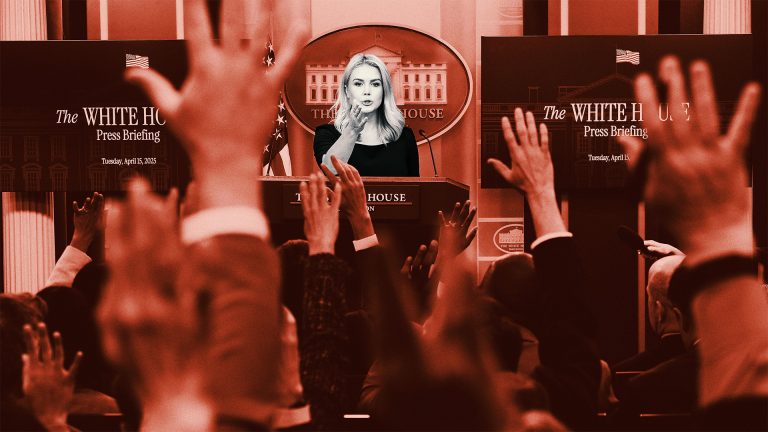

Karoline Leavitt, the queen of gaslighting
Stewart stepping up and into a presidential bid wouldn’t be unprecedented, either. Before his landslide victory in the 2019 presidential election, Ukraine’s president, Volodymyr Zelensky, began his career as a parodist, with a TV series in which he played a fictional president. He used comedy much the way Stewart does – as a means to call attention to absurdity and corruption in the political establishment.
Paradoxically, good satire requires honesty: there’s no parody without truth. Now that America has gone into the upside-down, comedians like Stewart and publications like the Onion have increasing appeal and power, not just as truth-tellers but as the only ones willing to recognise the absurdity of it all. For many, they become a sort of psychological antidote.
Stewart has historically said he’s not interested in seeking office – after Politico wrote in 2022 that he was the Democrats’ “best chance” in the next election, he tweeted, simply, “Ummm… No thank you” – but there are indications that his position is changing. In August, on his podcast The Weekly Show, speaking with the journalist Mehdi Hasan, Stewart said that “the Democratic Party is ripe for a takeover” and “they just need to find the right reality host”.
“Please, please, no reality hosts, I beg of you,” Hasan replied. “Unless, Jon, you’re thinking of throwing your hat in the ring, which I know many people want… if that’s what you’re suggesting, we can talk about that.”
“Stewart laughed,” Hasan wrote after the interview. “He didn’t deny that was what he was suggesting. He didn’t rule out throwing his ‘hat in the ring’. He didn’t recite some version of: ‘Don’t be crazy, Mehdi, I have no intention of doing that.’ There was a glint in his eye as he simply leaned his head back and… chuckled.”
Just this week, on The Weekly Show, Stewart gave the strongest hint yet that he was considering the idea. “So, who’s voting for me,” he said – laughing, but not dismissively. “Come on, who’s with me?”
“THIS IS HUGE. You can hear it in his tone,” a Twitter account called “Draft Jon Stewart 2028” posted in response. “He wants to run.”
It is worth rewatching in full Stewart’s 2010 speech at the Rally to Restore Sanity, in front of 215,000 people on the National Mall, because it offers a glimpse into what a Stewart candidacy might look like. It is transcendent of the comedy genre; funny, but sincere too. It reaches for higher ideals. It is, in fact, the sort of speech leaders give.
“We know, instinctively, as a people, that if we are to get through the darkness and back into the light we have to work together,” he tells the rapt crowd. “And the truth is, there will always be darkness. And sometimes the light at the end of the tunnel isn’t the promised land.”
“Sometimes it’s just New Jersey,” he jokes. “But we do it anyway. Together.”


